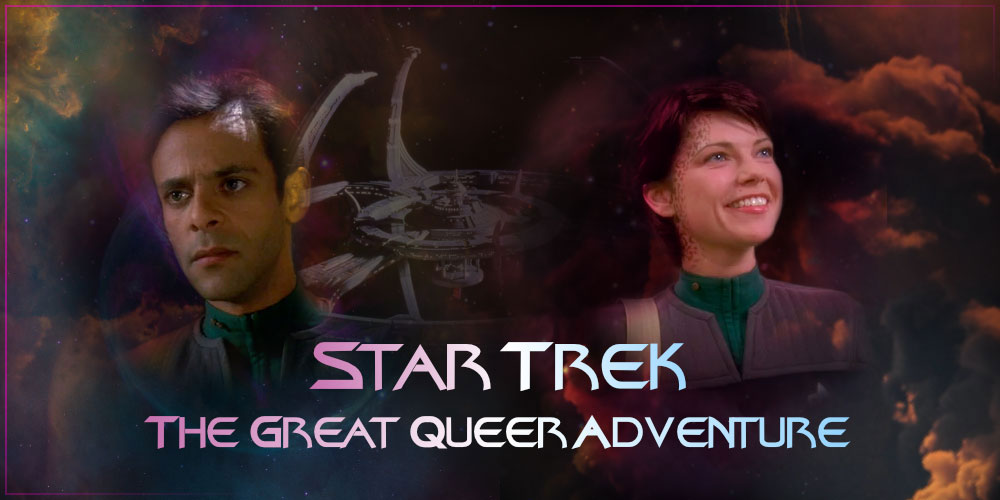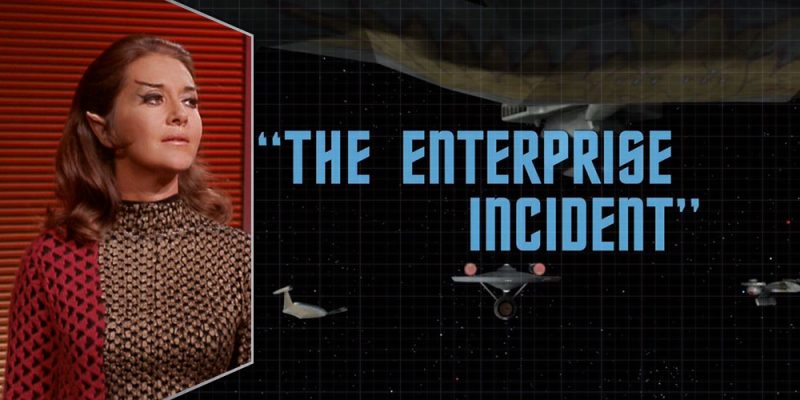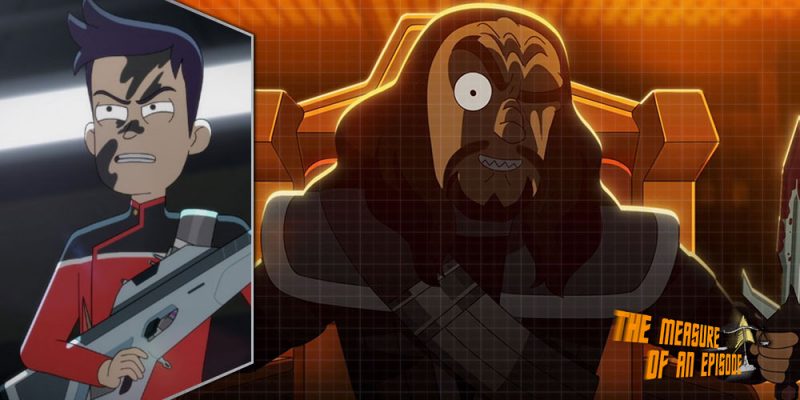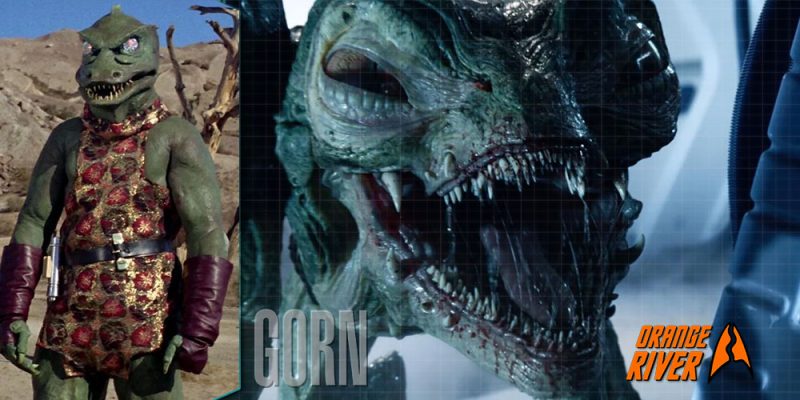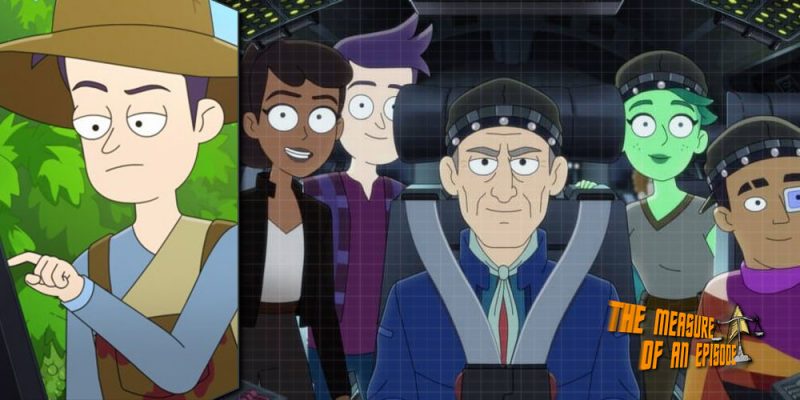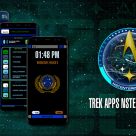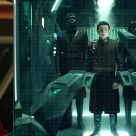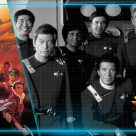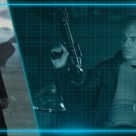Representation is nice, it’s a powerful thing to be recognised correctly on screen, to be seen as a person and not just as a joke, or a threat or as a prop in someone else’s story. When we are seen, and we are recognised as who we are it is an immensely powerful feeling. There is a space for us in this show, and it’s fandom. But when a show doesn’t have a broad-reaching form of representation, what do we do? Well, we headcanon something into place. We take the little spaces between stories and concepts and we use our own narrative glue to form our own personal ideas. So we can feel seen in some media.
For those not in the know, a “Headcanon” is something that isn’t on screen, but can be implied through material seen on screen, or just until the series states otherwise. This can be ships, past events in a character’s lives, heck, it can just be how does the crew of the Enterprise deal with lazy Sundays?
When it comes to queer rep. It’s a little harder. Especially in older shows. But that doesn’t stop us from trying, until it was confirmed, by Andrew Robinson (Garak), the popular headcanon for Deep Space Nine was that Garak was “Omnisexual”. With many headcannoning that the rift that grew between Garak and his father, Tain, was because of Garak’s queerness. This, however, is my own personal interpretation and really, this headcanon like so many that people have are incredibly personal and very subjective. We give an impression on the characters we want to be recognised as.
So then, the question for my fellow trans, enbies, and gender fluids in the audience. Do you have any characters in Trek that you headcanon as trans? It’s nice to think that characters in the future can be trans and there’s no big issue about it. Top scars, what are those? Hand me that dermal regenerator! Need to handle your blocker injections? Well, no fear of needles, it’s hyposprays all the way.
The future would be awesome for being trans. I wouldn’t have to wait 4 years just to get on a waiting list for a start. Given how often trans people are often signified in fiction by how we “stand out”, anyone in a Star Trek show could be trans. Riker, Hoshi, Wesley or Janeway. Heck, you wanna headcanon Nelix as trans? Go for it.
But you know who stands out most in my mind as someone who I headcanon as trans? Someone until very recently, I didn’t actually think to attach a very personal headcanon to,
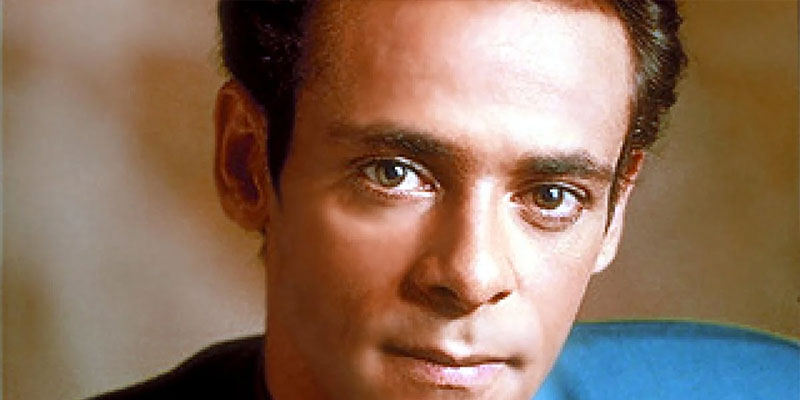
Doctor Julian Subatoi Bashir.
Doctor Bashir is an interesting character, we see this wonderfully goofy man step onto DS9 in the first episode “The Emissary”. Julian is one of the characters my partner and I heavily gravitate towards in sense of “Favourite show character”, well that and Garak. We have spent a lot of time talking about his character arc, how it has built and evolved over the series. The biggest episodes that stick out in our minds is “Our Man Bashir” and “Doctor Bashir I presume?”
Now, “Our Man Bashir” is that one Holodeck episode where things go awesomely wrong while Julian and Garak are on a date in the holosuite and they get stuck in Julian’s James Bond parody while trying to save the senior staff. It’s buck wild fun and I love it to death. But in that episode, Garak alludes to something (that would later be retconned into the canon), but he notes that Bashir has “a secret”. Along with being an episode excellent episode, it’s also a time when Bashir doesn’t have to hold back on his genetic enhancements, he can cut loose and be himself to the fullest of his abilities. It’s a space for him, as a character, to live a fantastical fantasy life as the suave, masculine hero, sort of reliving a boyish fantasy. Or potentially living a boyhood fantasy that he never got a chance to live. One of the big feelings of being trans, especially for those who transition at a slightly older age is that feeling of lost time, the idea that since you were never raised a certain way, allowed to focus on certain gendered interests you sometimes feel that you have to compensate for this by “going back” and living these moments. Now that’s not to say that any of this is true, or if it is indeed a universal trans experience. But personally speaking, I do sometimes have that feeling of “God I wish I could have done that” when looking at the larger experience of being “socialised female” and younger age.
This unintentional story arc reaches a point when we hit “Doctor Bashir I presume?” In an episode where Lewis Zimmerman has opted to use Julian as the template for the LMH, a new Long term medical program to supplement the EMH holograms. Julia asks Lewis very nicely to not talk to his parents. But Zimmerman doesn’t have the same ethical sub-routines that the EMH does and decides to invite his parents anyway.
Long story short, his parents let slip that he was genetically enhanced.
And there are a lot of ways I can go with this because it’s a damn fine episode and has helped solidify the concept that Julian is both trans and neurodivergent. The episode frames this reveal almost like he’s been outed, with him trying his hardest to maintain his secret, pleading with his parents to not let it slip.
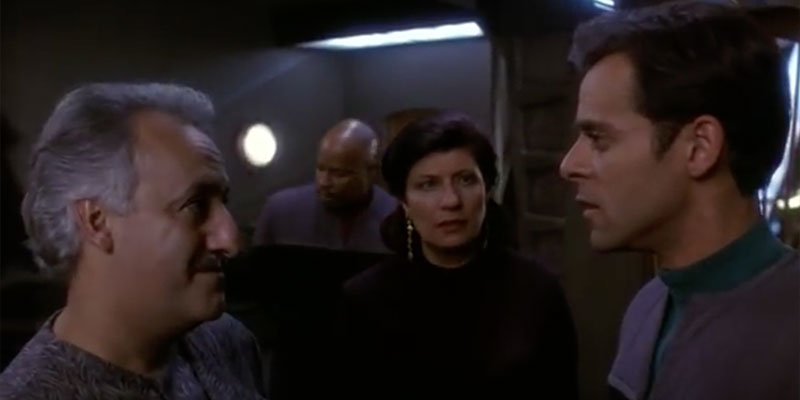
One of the most notable things is how is parents refer to him as Jules. While Bashir uses the name Julian. With Julian becoming incredibly uncomfortable with being named as such, framing it almost like he is being dead named. Even within the context of the episode Julian angry gives it similar connotations.
“No, you don’t understand. I stopped calling myself Jules when I was fifteen and I’d found out what you’d done to me. I’m Julian.”
This just speaks to me. While I have existed pretty harmoniously with most of my friends and family about my transitioning, I know from other friends and some rare personal instances that we often have to stand our ground and say “No, this is who I am. You don’t get a say in this. I made this call and deal with it.” Seeing Bashir, still struggling with people, (especially his parents who you’d assume would be close to him), to get across this idea of who he is now despite a pre-existing concept of who he is with them.
There is even a moment later in the episode when Julian speaks to Miles about his status as someone who is genetically enhanced. It reads like a great personal fear coming out and props to Siddig who gives the scene such a weight. His quiet performance here is of a man who has thought these lines over and over in his head a thousand times before because he has been constantly afraid of people finding out who he was. And I’ll be real here, damn did I have this mindset a lot when trying to build up the nerve to come out as trans in my old job.
“The word you’re looking for is unnatural, meaning not from nature. Freak or monster would also be acceptable.”
And at the time, there was a lot of anti-trans humour in my old workplace. While closeted there would often be a joke, well, many jokes about how trans people were strange, odd, wrong, or just “freakish”.
If I had a penny every time I mentally prepared a sentence like that in my head every time I thought about coming out to someone I could have probably gone private with my transition.
The rarity of trans representation in fiction means we do sometimes cling to characters we can so easily connect to. Trans lives in fiction are often seen as ones of suffering, pain, guilt, shame and secrets. And while “Doctor Bashir I presume” has all of these things, it’s one episode that deals with these feelings. Not an entire character. I will probably always see Julian as a trans man because it’s just one aspect of his story, not his life. Trans people’s lives aren’t just these simple stories. We aren’t all just hurt and sorrow. We have jobs, we go to school, we write Star Trek essays. To be treated as a person first and then as a trans person second, or even third, is pretty much the life long dream for most of us.
Of course, I’m not saying that this is evidence that Julian is trans, but there is enough room in the character to allow our own personal interpretations to come in and allow for me to see myself, or at the very least part of my own identity being positively represented on screen. Julian is successful, proud of who he is, and in the end, no one really cares that he is genetically enhanced. He is happy and safe.
So we have seen someone who within my personal bubble of headcanon is strong, self assure and knows who they are. But who among us struggles when the first come to terms with their queer identity? I mean, we pretty much all do. Finding ourselves as a new person is a trip and a half. We want to be ourselves, but what does that even mean when we stop to redefine who we are. And there is the most perfect character to use to discuss that allegory.
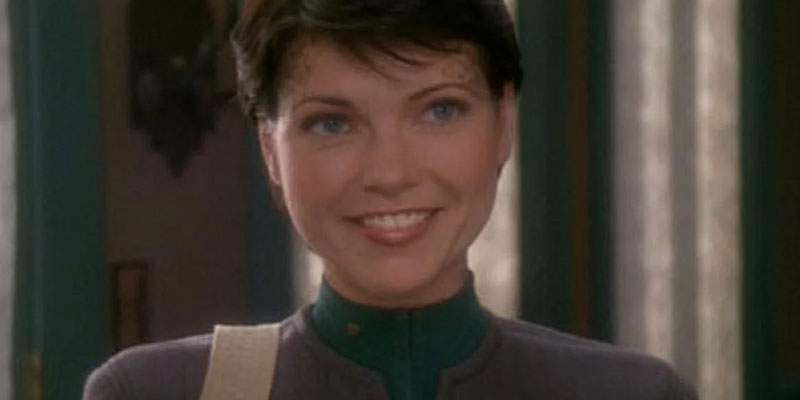
Enter: Ezri Dax.
Of course, so many queer people identify with both Ezri and Jadzia. A canonically bisexual, gender non conforming person who really is able to push the boundaries in Trek, and had the BEST wedding dress. Seriously, Mrs Farrell, you look amazing in that. Future cosplay right there.
But we will get back to Jadzia at some point. Right now I want to talk about Ezri.
To say the life of Erzi Dax is a bit rough is putting it mildly. She knew who she was. She was firmly in the camp of “I know who I am, I’m Ezri Tigan.” And then something happened. She became joined, and suddenly her life was flipped upside-down. But also because she started to stand on her head…
We know who we are until we are met with something larger than ourselves. When I started to realise I was trans, I was met with concepts that didn’t fit who I thought I was, or I felt like I din’t know who I was.
Coming out wasn’t some fancy affair of lightbulb moments and big hurrahs. (God I wish I had been smart enough to make a 40-minute video on coming out to David Bowie music), but instead, it was painfully slow, confusing and kinda hurtful to myself.
When Ezri became joined, the very foundation of who she was changed, though not destroyed or removed. There was now more to her that she couldn’t comprehend or understand at first. She wasn’t trained for this. In some respects, it is much like a closeted person trying to put queer concepts in order without having much of the language to do so.
Ezri is self-doubt incarnate at the early point in her character arc. I know a lot of fans saw this as an annoyance. A character that isn’t laser-focused and whip-smart? How dare they! I personally love it when Trek pulls the rug out from people getting too comfortable to remind us that not everyone in this show is the braves of the brave Captain Kirk, the calm and logical Spock, the warm-hearted Janeway. We struggle, I love the Ezris, the Barclays and Boimlers of this franchise. Those who take a little while workout how to get it right. They’re brilliant in their own regard, maybe they won’t ever be a captain, but they’re doing a damn fine job getting where they are.
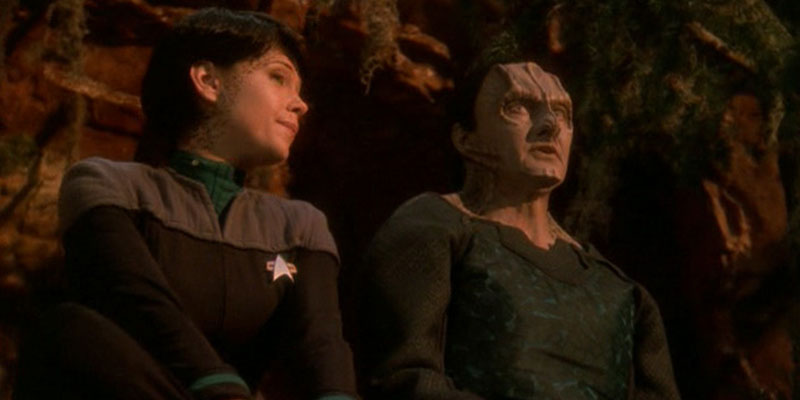
Ezri’s story is one of self-discovery, trying to put together. She’s finding out who she is, what sort of person she needs to be, not just to help others but to also help herself. One of the biggest questions she has when navigating her new life is “Who am I, really?”
Self-doubt is something that many of us will queer people will be plagued by as we through our lives “Am I doing this right?” is one of the biggest and strangest questions we face, to be the “right kind” of Queer person is such an odd question, we have a world that has only recently begun to be more tolerant of gay men and women, but is still incredibly hostile to trans people. Eventually, the answer is always the same, it is part of that journey of self-discovery, but we eventually learn that the kind of person, especially within our queer identity is the person we make for ourselves.
Julian and Ezri make a life and personhood for themselves our of the things that happen in their personal pasts. Born from complex trauma or rejection, they were able to answer the question of “What kind of person can I be?” I mean the right answer is, “Whoever the hell you want to be. So long as you’re a person who does good, then what more can you ask for?” And this is sort of unintentionally reflected in both Julian and Ezri, they are two people in professions dedicated to helping others.
I know a lot of this is all conjecture, fan theory, headcanon and drawing lines all over things to make it fit a certain point of view. But being able to see characters as trans, positive and happy, as people who get to grow and not suffer because of their queer status is something I hold dear to me. Though I know a lot of it just wishful thinking really. I know deep down that the writers never intended either characters to be a trans allegory, but that doesn’t stop me from hoping that people can see themselves reflected in the spaces between what the writers created.
With the expansion of LGBTQ elements and characters in Star Trek, with Stamments and Culber, Seven and Raffi, Grey and Adira, I really hope we get to see more of what Trek can offer us in terms of LGBTQ rep.
Personally I’m still hoping to see some badass trans Klingons. CBS, if you’re reading this, I’ve been brushing up, “nIHwI”e’ rur bIH!”
What are your own queer Star Trek headcanons? Has this changed how you look at Julian or Ezri? Let us know in the comments section below, we love to hear more of your thoughts of queer inclusivity in Star Trek!

